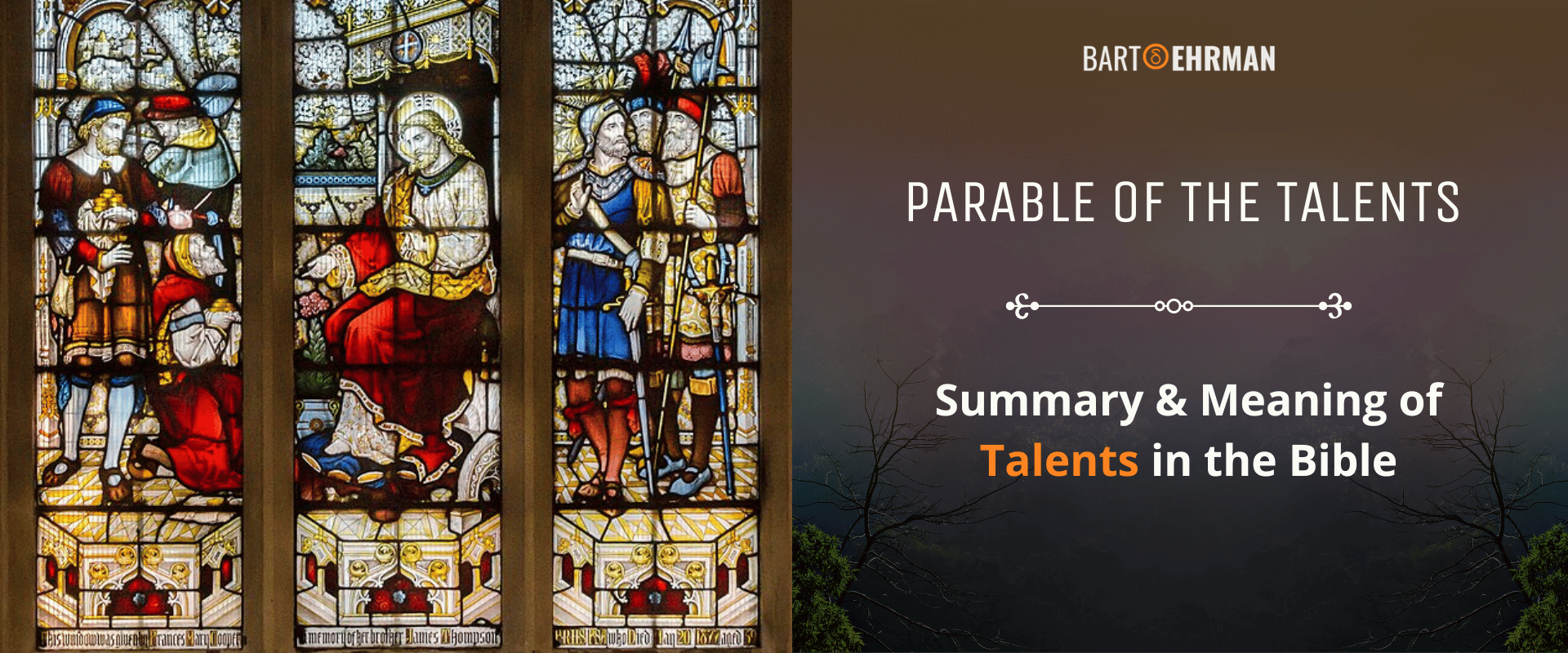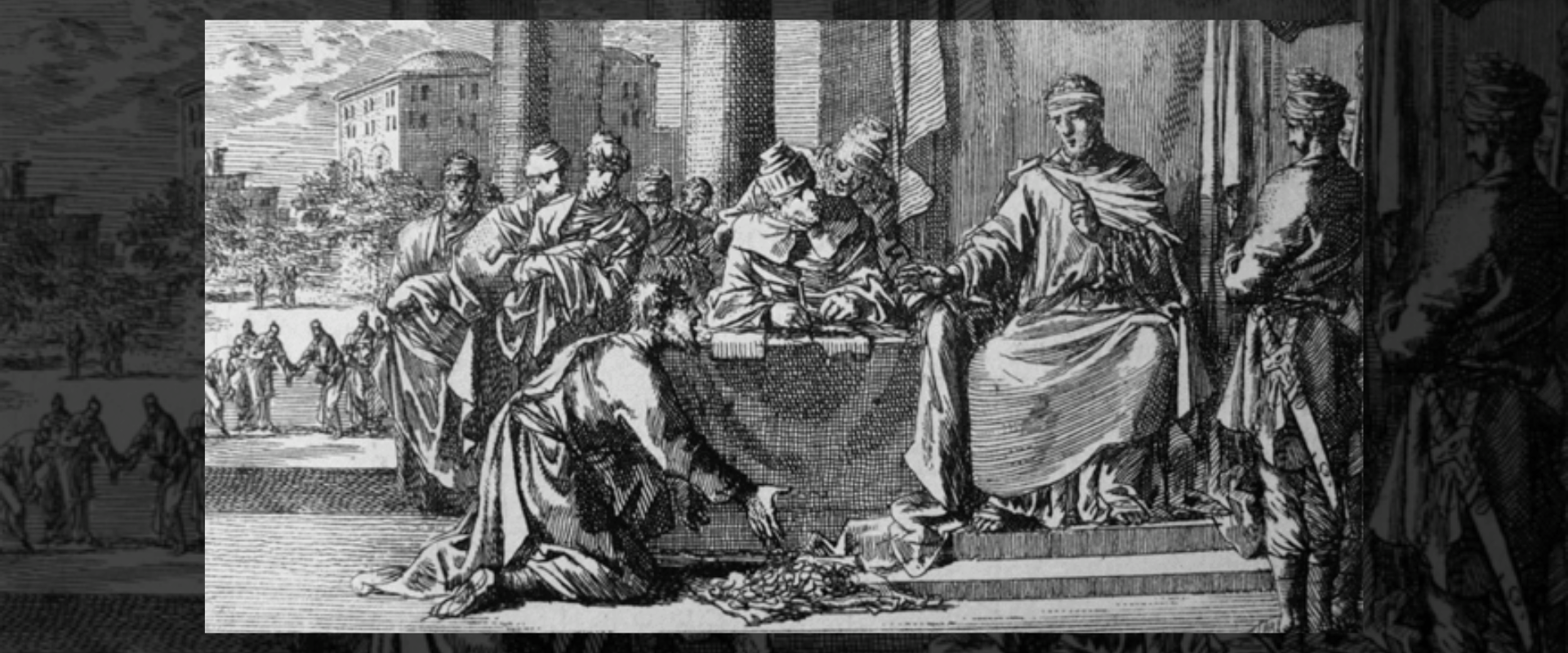Parable of the Talents: Summary & Meaning of Talents in the Bible

Written by Joshua Schachterle, Ph.D
Author | Professor | Scholar
Author | Professor | BE Contributor
Verified! See our editorial guidelines
Verified! See our guidelines
Date written: May 28th, 2024
Disclaimer: The views and opinions expressed in this article belong to the author and do not necessarily match my own. - Dr. Bart D. Ehrman
Scholars agree that the historical Jesus taught using parables, simple stories meant to convey deeper spiritual truths. One of these, the Parable of the Talents (sometimes called the Parable of the Three Servants), is found in slightly different versions in two of the Synoptic Gospels, Matthew and Luke.
There are several questions modern readers have about this story. What is the meaning of ‘talents’? Is it related to our modern word talent, or did it have a different meaning in its original language and context? Also, what is the Parable of the Talents’ meaning? Can we actually trace it back to the historical Jesus? Let’s dive in!

A Summary of the Parable of the Talents
The introduction to this parable in Matthew 25:14 has often been translated in English as “The Kingdom of Heaven is like…”, but this isn’t in our original manuscripts. Instead, the original Greek merely says “It is as if …” and then goes on to tell the story. This may seem like a minor detail but as I’ll explain later, it affects how we interpret the parable.
The story of the parable concerns a wealthy master who goes on a long trip. Before leaving he entrusts three of his slaves with a number of his ‘talents’. But what are talents in this context?
According to William Ridgeway, a talent (Greek: talenton) was a measure of weight weighing about 80 pounds. Like the English pound, it was also used as a measure of currency, equal to the value of that weight in silver.
Arland Hultgren says that one talent was equal to 6,000 denarii (singular: denarius). One denarius was the usual payment for a day’s work. If we assume that in Palestine there was a six-day workweek – no one would labor on the Sabbath – that means that just one talent was close to the value of 20 years of wages. This master was rich indeed!
To continue the story, the wealthy master specifically entrusts the three slaves with different numbers of talents “according to their abilities.” To the first he gives 5 talents, to the second he gives 2, and to the third he gives 1. Obviously, these sound like small numbers until you know the enormous amount of money 1 talent represents. These are actually vast sums.
After a long time, the master returns and calls his slaves in to see what they’ve done with his money. Both the first and second slaves have traded or invested the money with which they’d been entrusted and have doubled that money for their master. The master, of course, is delighted, saying to each
‘Well done, good and trustworthy slave; you have been trustworthy in a few things; I will put you in charge of many things; enter into the joy of your master.’
It’s not entirely clear what “the joy of your master” means here. Clearly these two slaves are being rewarded, but not with money which all goes to the master. Instead, they are given more responsibility and perhaps a bit more power while still remaining slaves.
The third slave who was given only one talent doesn’t do so well, from the master’s perspective. We are told that instead of investing the money, he merely buried it in the ground, handing it back to the master when he returns. As an explanation, he says
‘Master, I knew that you were a harsh man, reaping where you did not sow and gathering where you did not scatter, so I was afraid, and I went and hid your talent in the ground. Here you have what is yours.’
The Master is not pleased with receiving the same amount with which he started. He calls the slave wicked and lazy and tells him that he should have invested the money so that he, the master, could have gotten more. He takes the one talent and gives it to the slave who now has 10, presumably to further invest it for the master, and says “As for this worthless slave, throw him into the outer darkness, where there will be weeping and gnashing of teeth.”
By the way, while this article will focus on the Parable of the Talents, the version of this parable in Luke 19:12-27, known as the Parable of the Minas (or Parable of the Pounds), differs just a bit. Luke Timothy Johnson notes that in Luke’s version, differences involve a king acquiring a kingdom and the entrusting of ten servants with one mina each (a mina was another measure of currency. One talent equaled 60 minas).
Also, Luke’s narrative starts with citizens of the town sending a message to the would-be king that they didn’t want him to be their ruler. At the end, Luke adds that the king demanded that those naysayers be brought to him and executed along with the slave that buried his money.
Did You Know?
The Greek word doulos is used in Matthew to refer to the three people the master entrusts with his money. For a long time, English translations have rendered this Greek word as “servant.” However, a quick look at a Greek lexicon, a sort of dictionary of the uses of ancient words and their meanings, tells us that in nearly every instance in the ancient world, doulos, meant “slave.”
We can understand why translators might have changed this to “servant” early on. A servant is one who chooses to be employed and is paid. Thus, when Paul calls himself “a doulos of Christ,” it sounds to us as if he freely chose to accept this role.
Most scholars agree, though, that the real meaning of this phrase is “a slave of Christ,” indicating that Paul felt he had no choice in the matter. For modern readers, especially in the United States where we have a terrible legacy of slavery, this is very uncomfortable.
Nevertheless, if we are to truly understand the Bible, we need to understand the culture from which it emerged. Slavery was a huge part of ancient Mediterranean life. We might, then, ask why Paul and others used this word to characterize their relationship to Christ.
Did the Historical Jesus Really Use This Parable in His Teaching?
Most scholars see no reason to doubt that Jesus used parables in his teaching. This was a common method of instruction in Jesus’ time and can be found in other contemporary Jewish sources and later Rabbinic sources such as the Mishnah. But can we reliably trace this particular parable back to Jesus?
Because scholars agree that Jesus used parables, they tend to also believe that most, if not all, of the parables found in the Synoptic Gospels actually go back to Jesus. One notable exception is John Meier who wrote a multi-volume work on the historical Jesus called A Marginal Jew.
In volume 5 of that work, Meier controversially argues that only 4 of the synoptic parables actually go back to Jesus: the Mustard Seed, the Evil Tenants, the Talents, and the Great Supper. If even this skeptical scholar believes that the Parable of the Talents goes back to Jesus, as do many others, there is a good chance that it does.
Having established the parable’s authenticity, how might we interpret it?
FREE COURSE!
WHY I AM NOT A CHRISTIAN
Raw, honest, and enlightening. Bart's story of why he deconverted from the Christian faith.
Over 6,000 enrolled!
What Is the Traditional Interpretation of the Parable of the Talents?
The most common Christian interpretation of this parable says that it’s about using the gifts that God has granted us. In this view, the “talents” are actual talents in the modern English sense, abilities we have which we should use for God’s service to bring about the Kingdom of God. Failure to do so will result in not getting into heaven at the Last Judgment.
According to this interpretation, the ultra-wealthy master in the story is Christ. The first two slaves are faithful in using and thus multiplying the good they are given and are thus ushered into “the joy [their] master,” interpreted as heaven. The third slave, interpreting Christ as harsh and demanding, doesn’t use his resources wisely and is thus kicked out into the “outer darkness,” interpreted as hell.
While this is certainly the most widespread interpretation of this parable in churches, it is not the only one. Let’s look at another understanding of it based on ancient culture.
An Alternative Interpretation of Parable of the Talents
Scholars often argue that you have to understand the culture and time period in which biblical literature was written to understand their true meaning. As modern readers living in a capitalist society, we naturally see the value of investing capital and making more of it. But would ancient people have thought this way? Perhaps not.
Bruce Malina writes that in ancient Mediterranean societies, the majority of people wanted stability, not self-improvement. For this reason, someone trying to accumulate huge amounts of wealth was considered greedy and disreputable. Richard Rohrbaugh puts it this way:
Given the “limited good” outlook of ancient Mediterranean cultures, seeking “more” was considered morally wrong. Because the pie was “limited” and already all distributed, anyone getting “more” meant someone else got less. Thus, honorable people did not try to get more, and those who did were automatically considered thieves: To have gained, to have accumulated more than one started with, is to have taken the share of someone else.
How might this affect how Jesus’ original audience would have understood this parable?
Ched Meyers says that ancient listeners would have heard about the 2 slaves that doubled the master’s capital with disgust. The greed with which this investing was done was attributed to the rich – a miniscule fraction of the population – who defrauded others through trading, tax collecting, and lending money at interest, activities which the Hebrew Bible explicitly prohibits (See Exodus 16:16-20, Leviticus 25:36).
And yet, William Herzog writes that the doubling of money in the story implies that these are the very types of activities in which the first two slaves engage. If so, how can a master who rewards such nefarious activities represent God or Christ?
If we look at the parable through ancient eyes, the third slave is not a failure but rather the only one brave enough to speak truth to power, according to Meyers. The third slave accuses his master of being harsh and making a living by profiting from the labor of others, as all slave owners did. Could the third slave actually be the hero of the story?
When that last slave is banished to the “outer darkness,” Meyer says this doesn’t have to represent a classical notion of hell. Instead, it could mean that if one refuses to go along with the unfair system of slave labor that was the norm in Jesus’ time, one will be pushed out of society, likely becoming a beggar or even starving to death.
As I mentioned earlier, unlike many other parables Jesus used, this one doesn’t claim to be making a comparison to the Kingdom of Heaven, merely starting with “It is as if…” In short, the Parable of the Talents might not have been an uplifting story of good Christians getting into heaven, but rather a cautionary tale about the wrongs in Jesus’ society. Perhaps he was telling his listeners not to help masters acquire more and more wealth through illicit means, thereby becoming immoral themselves.
This accords perfectly with what Jesus says later in the same chapter (Matthew 25). He declares that at the final judgment, those who fed the hungry, gave water to the thirsty, and clothed the naked are the ones who will inherit God’s kingdom. Does it make any sense, then, to think the first two slaves helping their unscrupulous wealthy master acquire even more wealth are meant to be the heroes of Jesus’ story?

Conclusion
The Parable of the Talents is an instructive story Jesus told about a rich master who leaves some of his vast wealth, called “talents,” to be cared for by slaves before he goes on a trip. When he returns, two of the slaves have doubled his money and are thus rewarded while one merely buries the money, returns it intact to his master, and is banished as a result.
This parable likely does go back to the historical Jesus, according to scholarly consensus. But what is the Parable of the Talents’ meaning?
The most traditional understanding is that the talents represent actual talents or gifts that God gives each person. The first two slaves use those gifts for God’s service and are thus rewarded by getting into heaven. The last does not use his gifts wisely and is banished to hell.
However, several scholars have noted that in ancient Palestine, the ideal was not self-enrichment but stability. For most people in the 1st-century Mediterranean world, anyone trying to enrich themselves was dishonorable and would have been condemned. These scholars believe that the Parable of the Talents was actually a warning about the evils of society run by wealthy householders, people whose values would make them goats, not sheep on the Day of Judgment.

